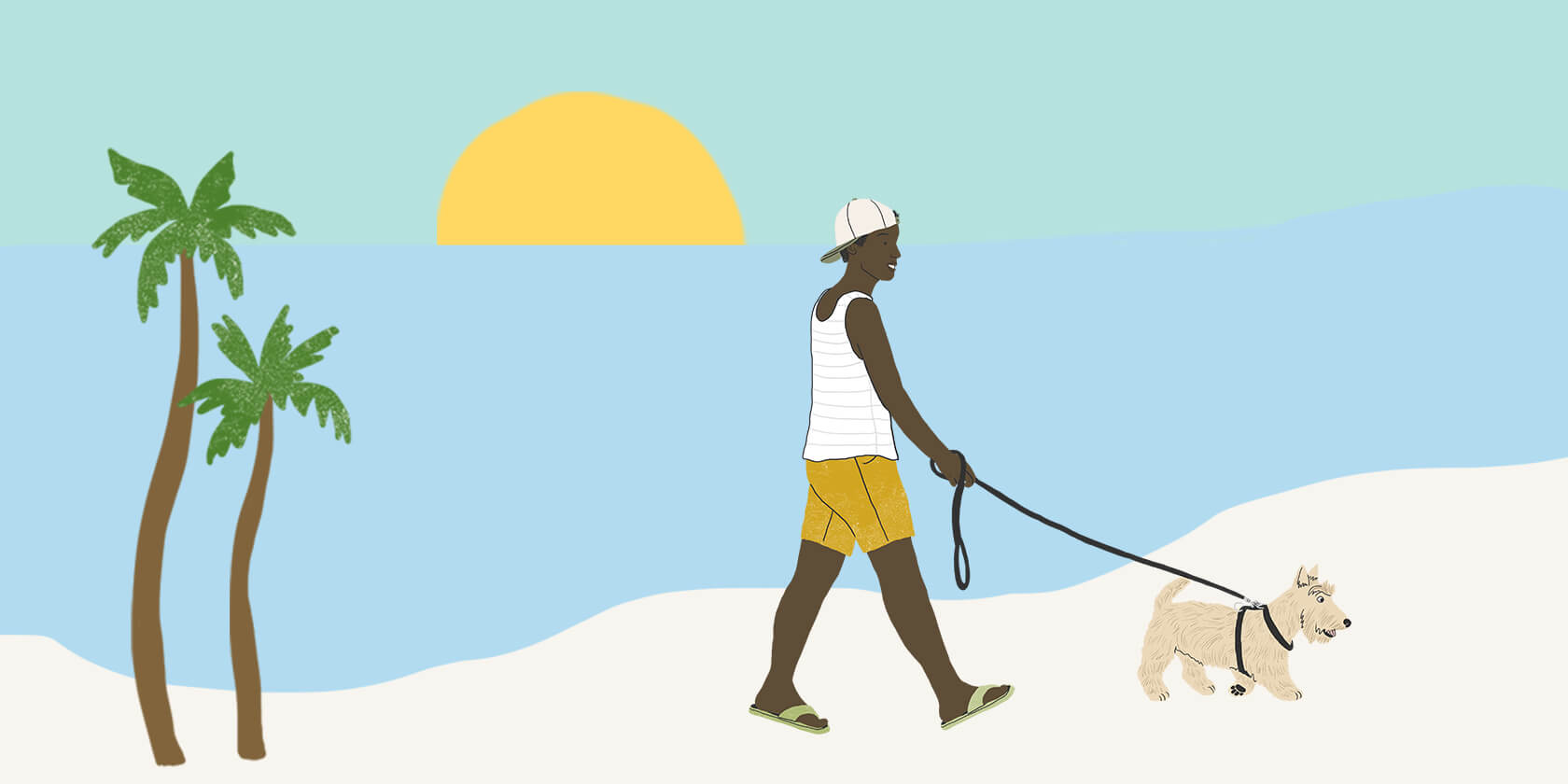With sunny days and warmer weather, many people want to grab their dog and head to the nearest beach! Taking your dog to the beach can be fun, relaxing, and a great way to give them some much-needed exercise and enrichment. But there are a few simple precautions to take to ensure your dog stays safe and you both have some fun by the water.
Finding Dog-Friendly Beaches
Before heading out, confirm that the beach allows dogs and is dog friendly. Dogs may not be permitted for various reasons — to protect wildlife, prevent waste from accumulating, or protect them from dangerous tides. Sometimes dogs are restricted during certain seasons or months of the year. Check the local rules for your beach, and then check out websites like BringFido. You can view ratings and reviews from other dog owners for different beaches around the world.
Just because a beach is dog friendly doesn’t mean it’s the same as an off-leash dog park. Always practice responsible dog ownership skills like keeping your dog on a leash where required or appropriate, having a come-when-called cue, and picking up your dog’s waste.
What to Do Before the Beach Trip
Think about how you’ll keep your dog safe and secure before beach weather hits.
- Vaccines. Since you’ll be in a public area with other dogs, make sure your dog is up to date on all vaccinations and preventatives. This includes rabies, DAPP (a.k.a. DHPP, a combination vaccine that protects against canine distemper, infectious hepatitis, adenovirus type 2, parainfluenza, and parvovirus), leptospirosis, Bordetella, and canine influenza. Flea, tick, and heartworm preventatives are also important to ensure you aren’t bringing home any parasites from other dogs or the environment (and should be given year-round, not just when headed to the beach).
- Collar and I.D., please! Have your dog wear a well-fitting collar or harness and identification tags with current contact information. If your dog gets lost at the beach, there’s an easy way for someone to physically hold on to your pup and contact you. If your dog has not been microchipped, consider doing so as an added layer of identification.

What to Bring to The Beach For Your Dog
When packing your beach bag, don’t forget supplies for your dog.
- Umbrella. Bring along an umbrella, canopy, or beach tent to provide a shady place for both you and your dog to rest out of direct sunlight. UV radiation from sunlight can be just as dangerous for dogs as it is for humans.
- Dog sunscreen. Just like people, dogs can get sunburn. Ensure your dog is protected with sunscreen specifically made for dogs, as human sunscreen can contain toxic ingredients for pets. The most common sunburn areas include their nose, belly, mouth, tips of ears, or anywhere where their fur is thinner. Sun protection is especially important for dogs with thin or no fur.
- Drinking water. Bring along lots of fresh, clean water for your dog to drink and a bowl for them to drink from. Running around in the sun can cause dehydration faster than usual. Having access to fresh water can reduce the chance your dog will drink salt water, which can cause gastrointestinal upset and even lead to dangerous dehydration.
- A dog towel. Don’t forget to pack an extra-large beach towel for your dog, giving them a resting spot off the hot sand.
- Regular leash and long lead. Bring along your dog’s regular leash for when you need them to stick closer to you. A long lead is a great alternative to letting your dog off-leash, as they are safer than retractable leashes. They give your dog more freedom while still providing safety and control if you need to guide them away from other beachgoers or animals. If using a long lead, it’s best to attach them to a harness rather than a regular collar, as you don’t want your dog hitting the end of the lead at full speed or straining against it and injuring their neck.
Potential Beach Hazards for Dogs
A beach environment poses some unique risks for dogs. Be aware of a few things and plan ahead to avoid injuries.
- Hot sand and sharp objects. You might be familiar with the hot sand “dance” humans do when walking barefoot on the beach — your dog can suffer burns on their paw pads, too. Beaches also often have rocks, beach glass, or sharp shells that can cause injuries to the paws. Consider having your dog wear booties, protecting them against paw pad burns or lacerations. Booties can also provide traction on wet terrain. If not wearing booties, check paws frequently for any debris or signs of irritation or burns.
- Heatstroke and dehydration. Dogs don’t sweat like us, and they can’t tell us when they’re getting too hot. Having fresh water to drink and providing a shady spot to rest is crucial to prevent overheating. If your dog loves to run and play, make sure they take frequent breaks and monitor for signs of heatstroke, including excessive panting, drooling, dark red gums, vomiting, diarrhea, collapse, and even loss of consciousness.
- Saltwater toxicity. Some dogs will drink or ingest saltwater while playing and chasing waves. If they drink too much, they can suffer from salt toxicity, an overload of sodium in their system. Salt toxicity can cause severe dehydration and be fatal, so it’s important to prevent saltwater ingestion as much as possible. Avoid throwing balls into the ocean during fetch, and don’t allow your dog to bite at waves.
- Sand fleas. These tiny bugs aren’t affected by your dog’s regular flea preventatives, and they can be quite a nuisance. Some ways to avoid sand fleas include:
- Avoid the beach after heavy rain, on overcast days, or at dusk or dawn when they are most active.
- Use dog-safe bug spray, taking care to apply to your dog’s paws and underside where sand fleas tend to hop on.
- Avoid digging in the sand on beaches where sand fleas are found.
- Dead fish. Fish, clams, crabs, and other things tend to wash up onshore and are quite enticing to dogs. But take care to keep your dog away from these creatures, as they might contain parasites or cause gastrointestinal upset. Bones from fish and other creatures can even cause a blockage or puncture in your dog’s gastrointestinal tract.
Do I Need to Wash My Dog After the Beach?
Yes. When you’re ready to head home, rinse your dog off with fresh water if possible. And when you get home, bathe them with hypoallergenic dog shampoo. Make sure they get a good scrubbing to remove any salt, sand, debris, and sand fleas. Give their collar or harness a scrubbing, too, and let these dry completely before putting them back on your dog — leaving wet gear on your dog can cause a skin infection.
ZPC-01224R1



